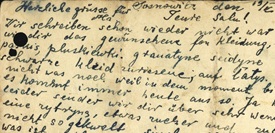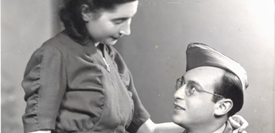Liberation
 “If it weren’t for these dire straits, things would
be
“If it weren’t for these dire straits, things would
be
different, Sala, believe me!”
“I have the pictures of our
dear father and dear mother,
together with all the mail I
received from home, starting
from the first minute that
I left for camp.”
After liberation, Sala and her friends wanted only to go home. Sala paused to gather her letters and then walked, rode atop freight trains, and hitchhiked to Sosnowitz. There was no sign of her family. The Polish families living in her former home professed to know nothing of the previous tenants.
Since Sala and Harry had
agreed to meet in Prague if they survived, that was her next
destination. Czechs welcomed refugees such as Sala with food
and housing. She contacted Harry, who sent a telegram telling
her to wait for instructions, but ultimately he refused to
see her. Years later, Sala learned that Harry had married a
woman who had also been on the Dyhernfurth death march.
Sala soon set off again in search of family members, this time heading for the largest gathering of refugees, in Bergen-Belsen, Germany. En route, she stopped in the charming Bavarian village of Ansbach, where she and other survivors celebrated their first Jewish New Year in freedom in the town’s Baroque synagogue. Afterward, a young soldier from New York, Corporal Sidney Kirschner, introduced himself to Sala. They conversed in Yiddish, the only language they shared. After a brief courtship, and with the reluctant consent of Sidney’s mother, they became engaged.
 Sala Garncarz and Corporal Sidney Kirschner, January 1946
Sala Garncarz and Corporal Sidney Kirschner, January 1946Soon after meeting Sidney, Sala joyfully confirmed through the informal network of refugees that two sisters, Raizel and Blima, were alive. They were among the handful of women who survived a 280-mile death march from Neusalz to Bergen-Belsen. Upon liberation, the sisters were sent to Sweden, where they were recuperating from typhus, tuberculosis, and heart disease. The letters began again. Sala wrote her sisters: “I have the pictures of our dear father and dear mother, together with all the mail I received from home, starting from the first minute that I left for camp. All along, I watched it and guarded it like the eyes in my head, since it was my greatest treasure.”
Sala and Sidney were married in a civil ceremony in Ansbach, Germany, on her 22nd birthday, March 5, 1946. He returned immediately to New York, to begin the immigration process that would bring his new bride to America.
View section images